Like any vehicle, a motorcycle engine can overheat if it's worked too hard for too long. So, what is a normal engine operating temperature? We did the research to bring you the answer.
A motorcycle engine typically operates at between 150-220 degrees Fahrenheit. However, this range can differ slightly depending on the make, model, driving habits, and climate conditions. Nonetheless, if your motorcycle engine runs over 250 degrees Fahrenheit, it's definitely time to take a break and let it cool down.
For the health of your engine, it's best to keep an eye on the temperature gauge and make sure that it doesn't exceed the safe range for too long. In this article, we will discuss the safe range for motorcycle engine temperatures, what causes engines to overheat, and how to prevent it. In addition, we will answer other frequently asked questions about motorcycle engine temperature, so read on!
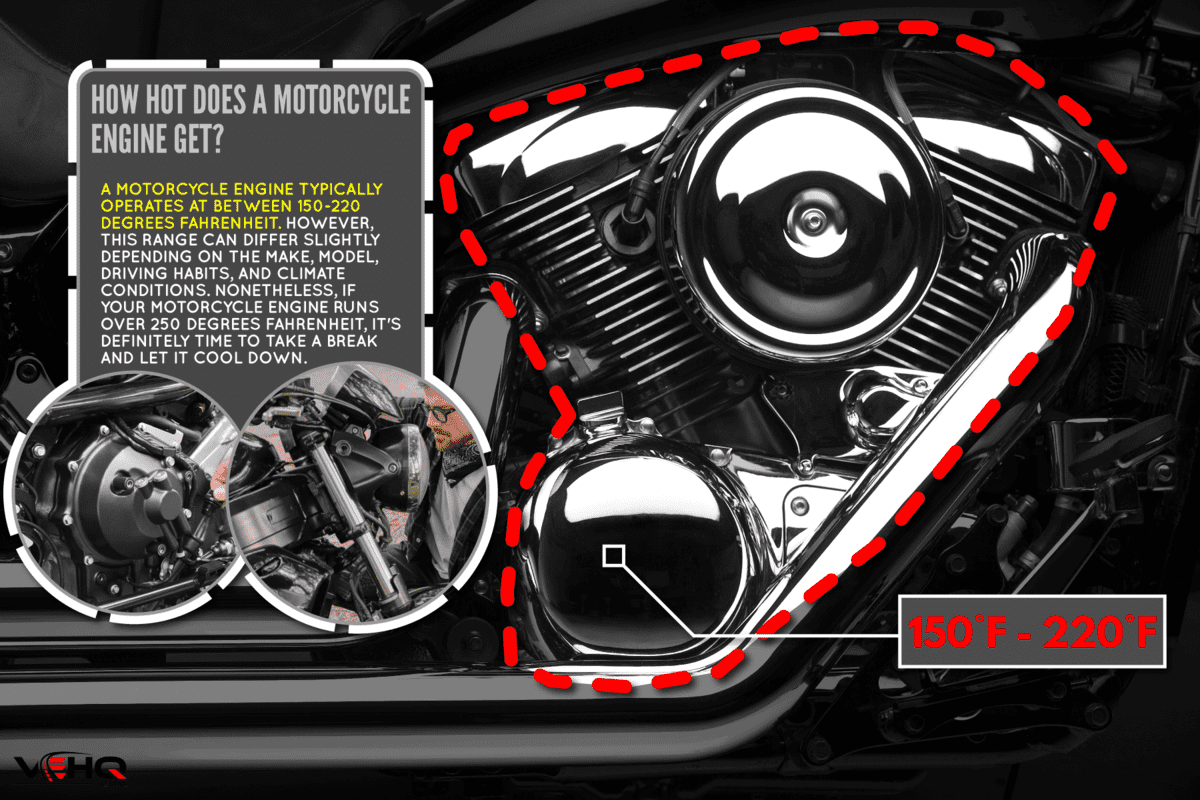
What Is The Safe Range For Motorcycle Engine Temperature?
As we mentioned, the safe range for motorcycle engine temperature is typically 150-220 degrees Fahrenheit. However, there are a few things that can affect this range.
First of all, the make and model of your motorcycle can play a role in its normal operating temperature. For example, sports bikes tend to have higher operating temperatures than cruisers because sports bikes are designed to perform at a higher level and require more power from the engine. As a result, they generate more heat.
In addition, climate conditions can also affect the range of motorcycle engine temperature. For instance, if it's very hot outside, your engine will tend to run hotter than usual.
On the other hand, if it's cold outside, your engine may not reach its normal operating temperature and could run a bit below 150 degrees Fahrenheit.
Lastly, your driving habits can also affect engine temperature. If you're constantly pushing your motorcycle to its limits, the engine will run hotter than if you're just cruising around town.
So, if you want to keep your engine in good health, it's important to be aware of these factors and adjust your driving accordingly.
Typically, operating temperatures over 250 degrees Fahrenheit are cause for concern, and you should take a break to let your engine cool down. Any engine that overheats can suffer serious damage, so it's important to be proactive and prevent it from happening in the first place.

What Causes Motorcycle Engines To Overheat?
In addition to the factors mentioned above, there are a few other things that can cause motorcycle engines to overheat. Let's take a look at some of the most common causes below:
Low Coolant
Engines need coolant to help keep them cool and prevent overheating. If your motorcycle is low on coolant, it's more likely to overheat.
So, be sure to check the level of coolant in your engine regularly and top it off as needed. You should also check for leaks and have them repaired as soon as possible.
In addition, contaminated coolant can also cause engines to overheat. For example, if other fluids, such as oil, get into the coolant system, it can cause clogs and prevent the coolant from doing its job.
As a result, the engine will overheat and could suffer serious damage. So, if you suspect that your coolant is contaminated, be sure to have it flushed and replaced as soon as possible.
Failing Radiator Fan
The radiator fan helps to keep the engine cool by circulating air over the radiator. If the fan is failing or not working properly, it won't be able to do its job, and the engine will overheat.
So, if you notice that your engine is overheating, be sure to check the radiator fan and see if it's working properly. If you are unsure how to do this, you can always consult a professional mechanic.
However, it could be just a dirty or clogged radiator. In this case, you can try cleaning it with a hose or taking it to a professional to have it cleaned.
Worn Out Engine Parts
Over time, engine parts will wear out and need to be replaced. When this happens, it can cause the engine to overheat.
For example, worn-out piston rings can cause oil to leak into the combustion chamber. This will cause the engine to run hotter than normal and could lead to overheating.
In addition, worn-out bearings can also cause engine overheating. This is because they allow too much friction and heat to build up in the engine.
Low Oil Levels
If you have waited too long to change your oil, it can cause the engine to overheat. This is because dirty oil can't do its job as well and will cause the engine to work harder than usual.
In addition, without enough oil, the engine will have a hard time keeping itself lubricated. This can cause friction and heat to build up, leading to an overheated engine.
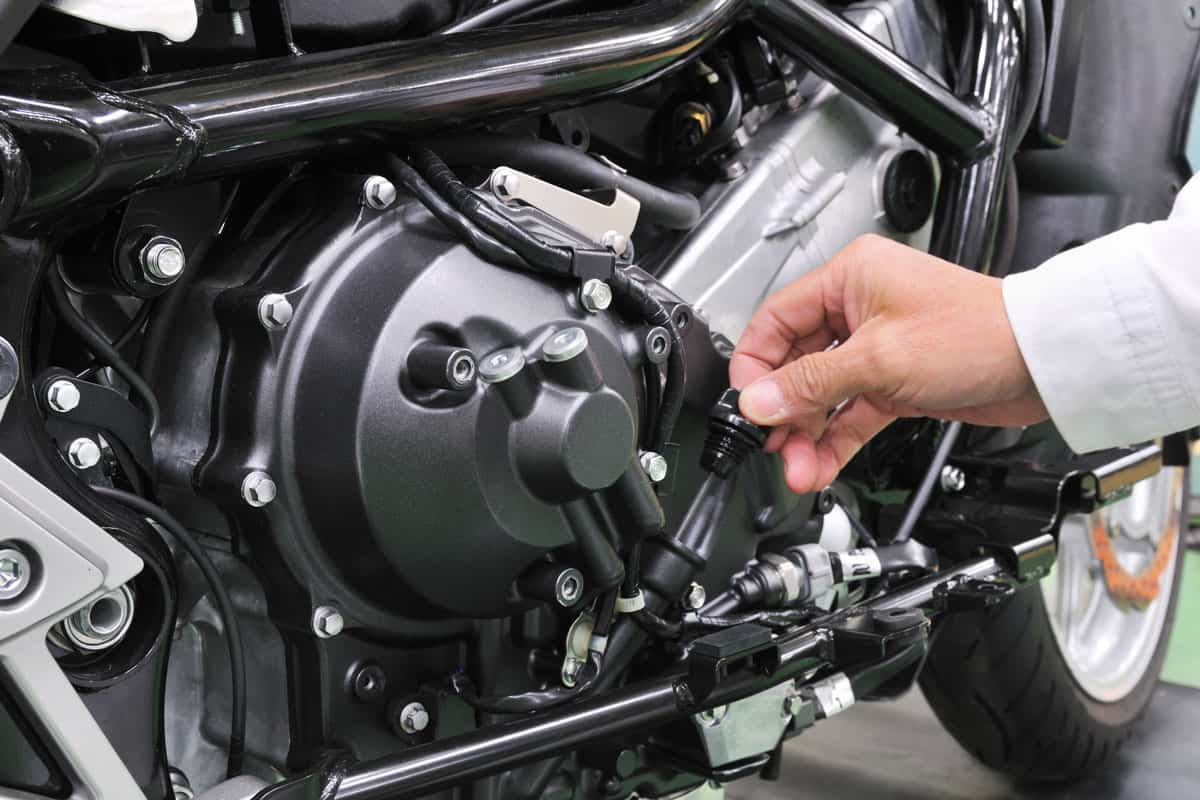
Faulty Water Pump
A water pump's job is to circulate water and coolant through the engine. However, if it's not working properly, it can cause the engine to overheat.
One of the most common signs of a failing water pump is an overheated engine. So, if you notice that your engine is running hot, be sure to check the water pump for any signs of failure.
Sometimes, a water pump that is on its way out will make a noise. So, if you notice any unusual noise coming from the water pump, it's best to have it checked out by a professional.
Poor Air/Fuel Ratio
Over time, your motorcycle parts can start to wear down. As a result, it can cause the engine to run lean. A lean engine is one that doesn't have enough fuel to run properly. Instead, it's getting too much air. This can cause the engine to run hotter than normal and eventually overheat.
It can also cause a pinging or knocking noise. If you notice either of these, it's best to have your engine checked out by a professional as soon as possible.
Bad Thermostat
A bad thermostat can cause the engine to overheat. This is because it prevents the coolant from flowing properly and causes the engine to run hotter than normal.
In addition, a bad thermostat can also cause the engine to run too cold. This can lead to condensation and corrosion, which can damage the engine.
So, if you notice that your engine is overheating or running too cold, be sure to check the thermostat and have it replaced if necessary.
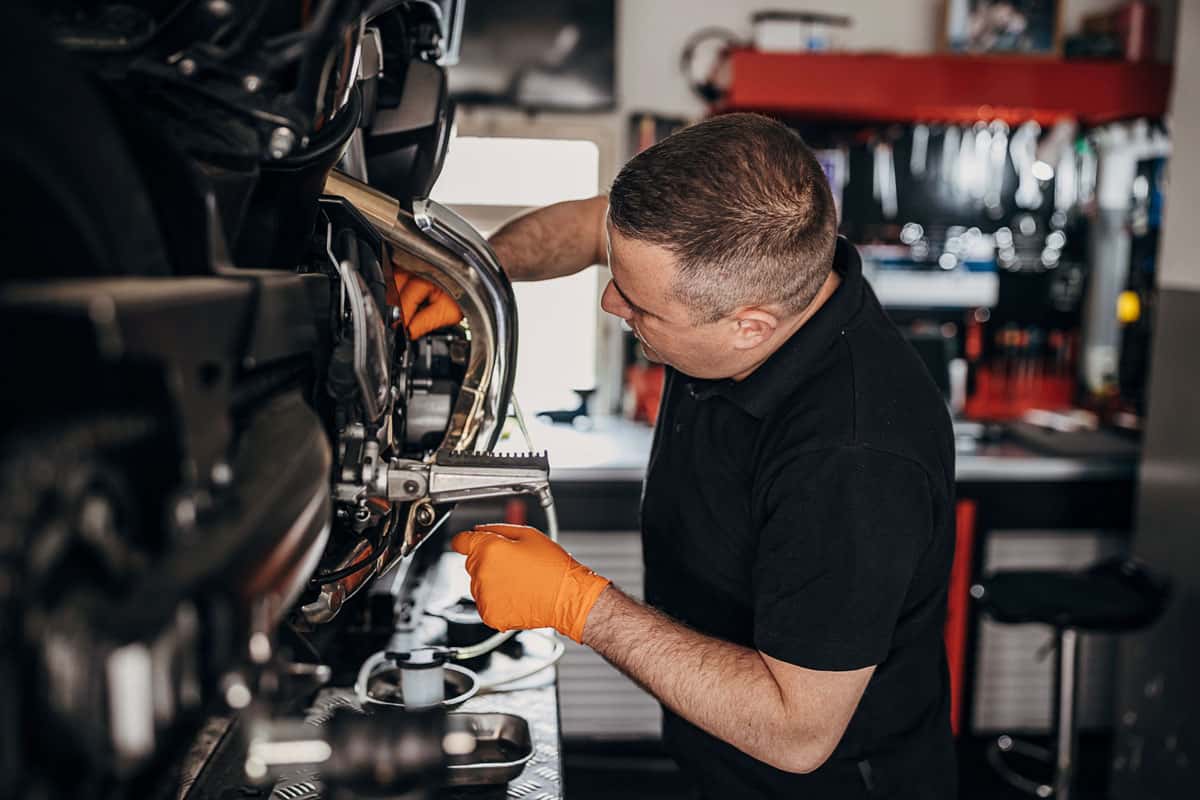
Can I Pour Water On An Overheating Motorcycle Engine?
No, you should never pour water on an overheating engine. This can cause the engine to seize up and cause serious damage. In addition, it can result in a cracked block.
If your engine is overheating, the best thing to do is to turn it off and let it cool down. Once it's cooled down, you can check the radiator and water pump for any signs of failure.
If everything looks good, you can start the engine and let it idle until it reaches operating temperature. This will help to burn off any condensation that may have built up in the engine.
If your engine is still overheating, it's best to consult a professional mechanic. In this case, have your motorcycle towed to a nearby service station or dealership.
How Often Should You Change Coolant In A Motorcycle?
As mentioned earlier, coolant levels are important for keeping your engine operating at the proper temperature.
It's generally recommended to you change your coolant every two years or 24,000 miles, whichever comes first. However, if you ride in dusty or dirty conditions, you may need to change it more frequently.
To check your coolant level, simply remove the coolant reservoir cap and check the level. If it's low, add more coolant until it reaches the "full" line.
Be sure to use the correct type of coolant for your motorcycle. This information can be found in your owner's manual.
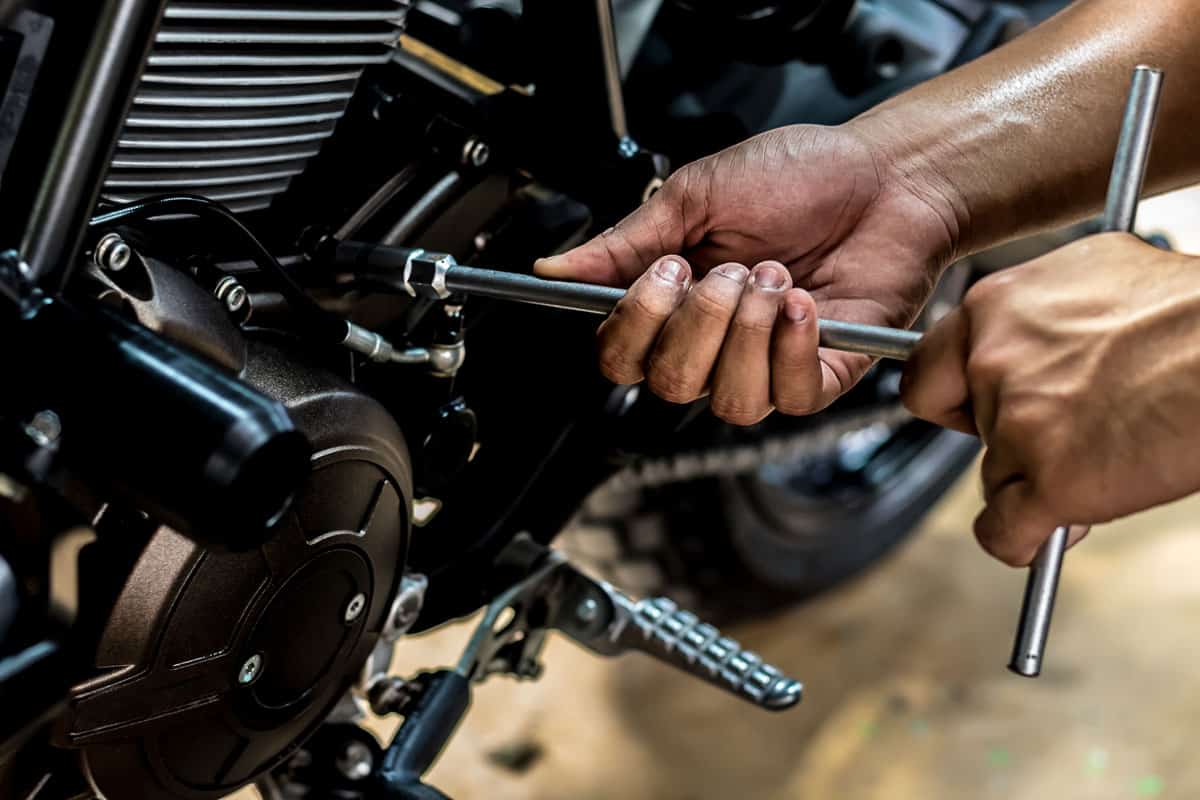
How Do Your Prevent A Motorcycle Engine From Overheating?
There are simple things you can do to help prevent your engine from overheating. The biggest thing is staying on top of your fluid levels.
The two most important are the oil and coolant. By ensuring that these are at the proper levels, you can help prevent your engine from overheating.
In addition, it's important to regularly check your motorcycle for any signs of wear and tear. This includes checking the radiator, water pump, and thermostat for any leaks or damage.
Lastly, by not driving at excessively high speeds and making quick accelerations, you can help prevent your engine from overheating.
If you follow these simple tips, you can help keep your engine running cool and prevent it from overheating.
Final Thoughts
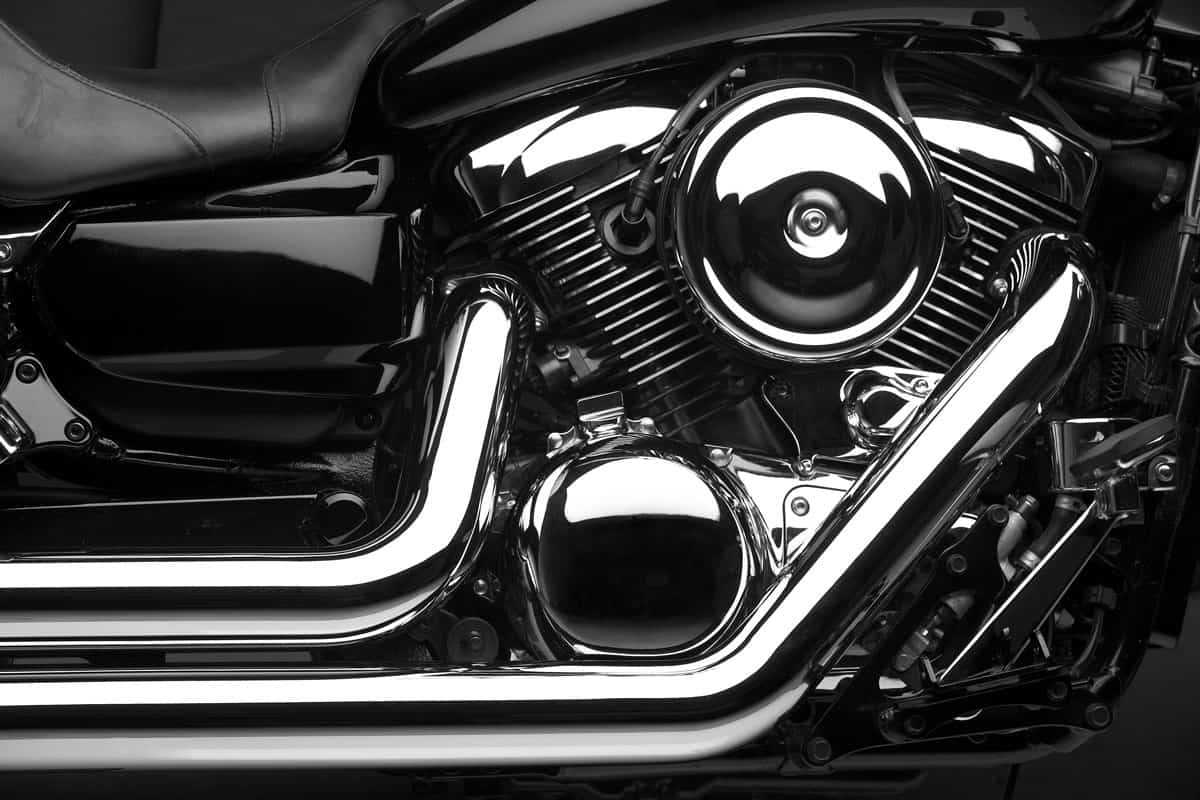
At the end of the day, taking proper care of your motorcycle is the best way to prevent problems like overheating.
By following the tips in this article, you can help keep your engine running at its best and avoid any major issues. However, if you do notice that your engine is starting to overheat, be sure to consult a professional as soon as possible.
Made it to the end? Here are other articles you might find helpful:
How Long Do Motorcycle Tires Last?
